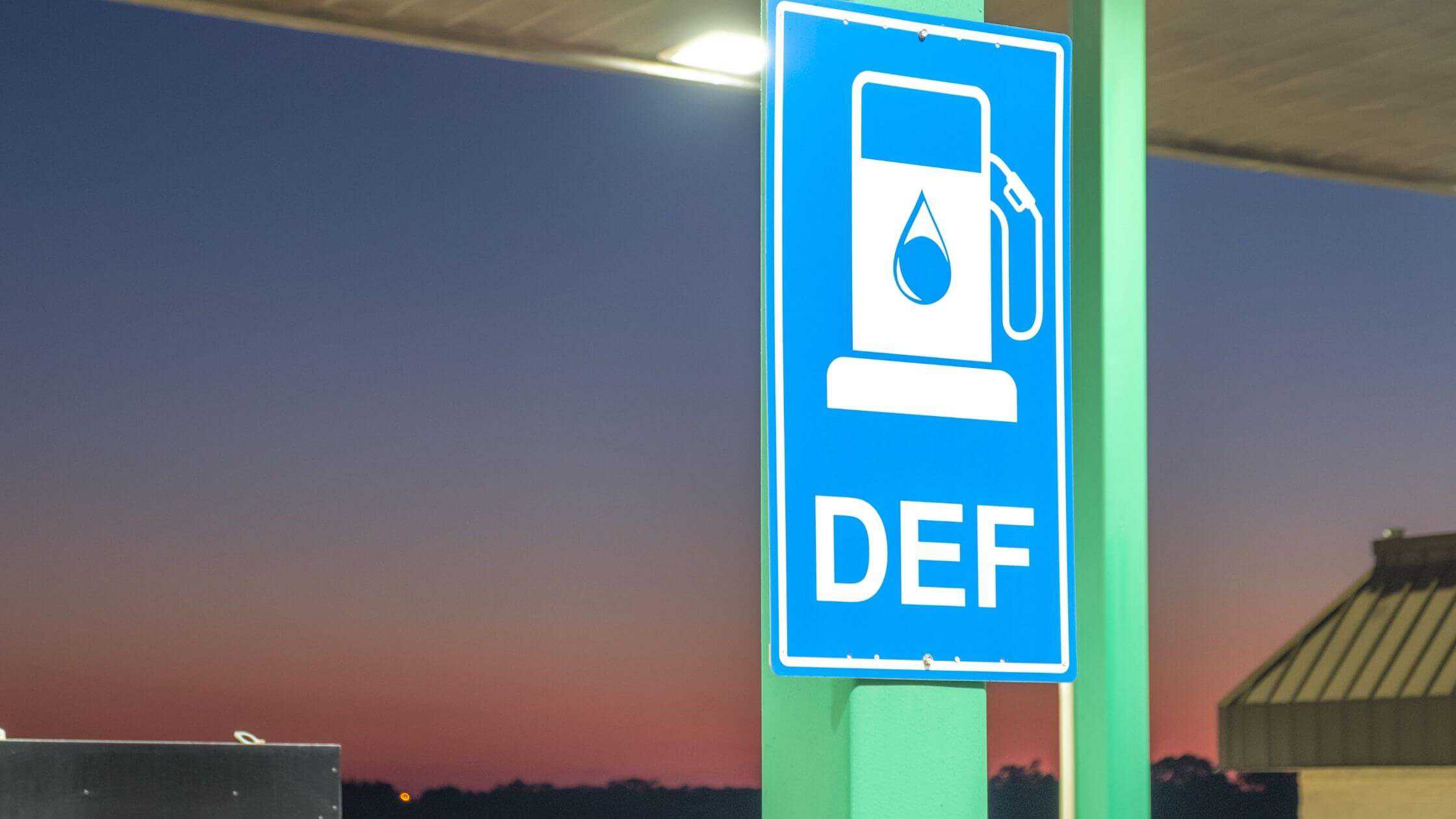Recognizing and Preventing DEF Expiration

Diesel exhaust fluid, or DEF, is crucial for keeping your diesel engines running up to EPA code. However, while not classified as hazardous, DEF has a set shelf life. Contamination shortens this shelf life even further.
Bad DEF can cause corrosion and permanently damage diesel engines and equipment, so it’s critical to know how to recognize the signs of DEF expiration. Establishing safe handling standards will help you and your team maintain emissions compliance and extend the life span of your diesel machinery.
Control of diesel fuel emissions is critical to the sustainability of trucking and other industries. Therefore, ensuring your DEF system operates smoothly within your engine and in terms of storage and disposal will help secure your future.
Ensuring proper use, storage, and disposal of DEF helps determine whether the fluid you use is working effectively or not or even damaging your machinery. The standard date code for DEF expiration is set at around one year. After this, the DEF fluid simply isn’t as effective as a diesel particulate filter.
It’s simple to fill up the DEF in your truck’s engine since DEF is sold at most diesel refueling stations. However, even refilling can be complicated when temperatures fluctuate or when DEF gets mistakenly added to the wrong tank.
Degraded DEF quality directly impacts whether a vehicle or other diesel machinery passes EPA emissions tests. Fortunately, a few simple strategies will help you recognize and prevent DEF expiration, keeping your diesel engines running safely.
How Long Does DEF Last?
DEF shelf life is determined by how long the solution effectively neutralizes harmful diesel fuel emissions. Typically, DEF expiration dates are set at one year from the date of manufacture.
The shelf life of DEF comes from its makeup. DEF is simply water and urea, with a 32.5% urea concentration. This solution of synthetic urea and deionized water binds with and helps neutralize harmful emissions in diesel exhaust.
Also known as blue def, DEF is placed in a separate tank in a diesel engine, identified by its blue cap. Because it is an emissions control fluid and not a fuel additive, one should never pour DEF directly into fuel or other tanks.
The shelf life of DEF is directly impacted by any oil or fuel contamination, so safe storage is critical for preventing early DEF expiration. Diesel exhaust fluid should be stored only in high-density polyethylene tanks and containers used exclusively for DEF.
When working effectively, DEF reduces emissions of diesel nitrogen oxide, or NOx, into the atmosphere through a process called selective catalytic reduction, or SCR. This process essentially converts the NOx into water molecules and harmless gas.
Understandably, given the complexity of this technology, the SCR system in a diesel engine is subject to corrosion if contaminated DEF is introduced.
The American Petroleum Institute (API) certifies and monitors diesel emissions and products, helping control NOx levels. It’s essential to use only API-certified DEF to treat your diesel engine exhaust.
Does DEF Go Bad?
Like many fuels, additives, oils, and other liquid components of diesel engines, DEF is only safe and effective to use for a finite period. DEF expires after about one year, assuming it isn’t contaminated before then.
Fortunately, identifying bad DEF is relatively easy since clean DEF is a clear liquid. A visual inspection will help you determine whether the fluid contains any foreign particles.
Age and contamination may turn the liquid cloudy or give it color. Contamination can easily occur when container nozzles are not kept clean or when funnels used for other liquids are used to pour DEF. In such cases, the bad DEF should be safely disposed of before the container is cleaned.
Properly storing your DEF will help extend its shelf life and prevent contamination that would make the fluid unusable. Use ISO-approved containers made of polyethylene or stainless steel. Keep in mind that DEF corrodes aluminum, so particular fuel containers are not appropriate for DEF.
When you purchase or refill DEF in jugs, totes, or drums, it’s necessary to clearly date and label the container with expiration dates to prevent the use of contaminated or expired DEF. Sealed containers of DEF come with date codes that indicate when the DEF expires.
High heat and direct sunlight cause DEF to degrade more quickly. This is particularly important when you are dealing with a single gallon of def, which will heat quickly even in the bed of a truck.
On the other hand, previously frozen DEF is still usable if its container is intact. In cold weather, it’s easy to mistakenly believe that DEF is unusable because the low temperatures turn the fluid into slush. However, slushy DEF is safe to use.
Keep in mind, however, that frozen DEF will expand, so it’s wise to avoid completely filling a DEF tank, gallon jug, or other containers.
Ideal DEF Storage Temperatures
It’s simplest and safest to store DEF in approved jugs, drums, totes, or in a designated DEF tank. While cold temperatures, and even freezing, do not impact the efficacy of DEF, heat can rapidly degrade the fluid. Generally, you should store these containers of DEF indoors at around 50 degrees Fahrenheit.
Of course, different climates may affect your DEF differently. In cooler climates where summer temperatures do not rise above 65 degrees Fahrenheit, it may be safe to store your DEF outside, as long as it remains out of direct sunlight.
Remember that a smaller container, like a gallon jug, is more susceptible to storage temperature. Never fill a gallon of def to the brim. Freezing will cause the fluid to expand and may burst the container.
Keep in mind that even maintaining a stable temperature will not prevent your DEF from eventually expiring. In areas where temperatures fluctuate dramatically, tracking temperature changes will alert you to the need to check for any related issues with your DEF.
How to Tell if DEF Fluid is Bad
Fortunately, it’s generally simple to identify bad DEF fluid. Because of its molecular composition, DEF reacts with other liquids and becomes discolored or cloudy. This may also occur if DEF begins corroding an unapproved container.
Because the synthetic urea in DEF is corrosive, it should be stored in approved containers and transferred through nozzles or funnels composed of approved materials, like polyethylene. However, even when stored in appropriate containers, DEF can still expire over time. Just like single-use and gallon jugs, larger tanks of DEF should be clearly marked with expiration dates and emptied before refilling. In general, DEF expiration occurs after one year.
You may wonder, does def go bad in a tank? The simple answer is that all DEF expires, so it’s critical to keep track of refilling dates for larger, permanent tanks. Pouring a small quantity of the fluid into an open container is an easy way to confirm the DEF is still clear and free of particulates, too.
Final Thoughts
Given all the elements involved in maintaining clean DEF, many fleets create set handling standards specific to DEF. You may also want to designate an individual to manage expired DEF disposal and help maintain emissions certification and the integrity of the diesel engine components exposed to DEF.
Maintaining emissions safety and keeping your diesel machinery running well requires careful attention to DEF expiration and contamination concerns. However, by following these simple strategies, you will give yourself the peace of mind that your DEF is effective and your machinery compliant.
Learn more about proper DEF storage from your Retif Oil & Fuel representative.



